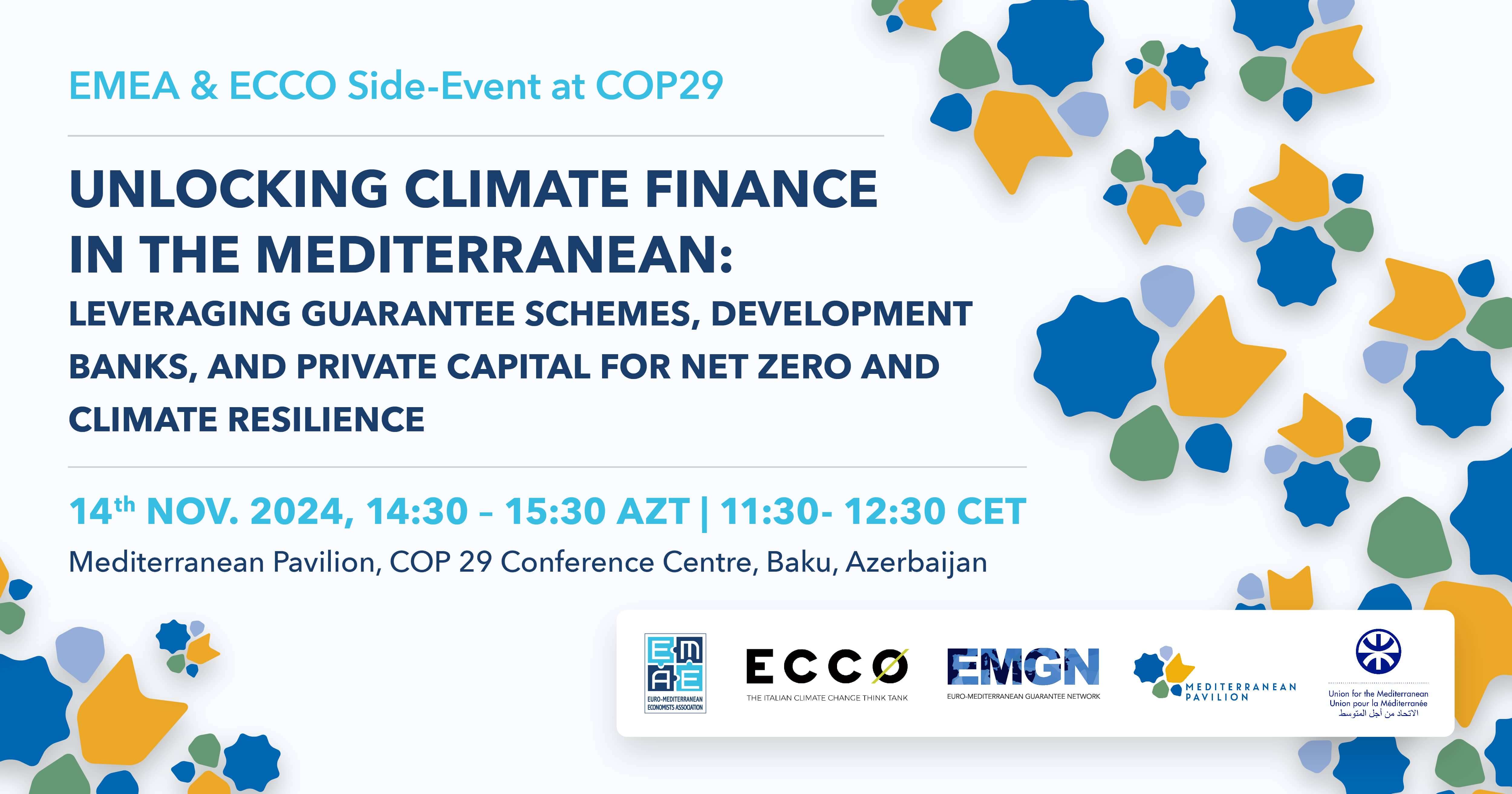
- This event has passed.

At COP28, over 130 countries committed to a global pledge to triple the world’s installed renewable energy capacity to at least 11,000 GW by 2030. The Mediterranean, situated between the global North and South, has an opportunity to contribute to this ambitious target through a unified regional approach to decarbonization. By harnessing its vast renewable potential—especially in solar and wind, estimated to exceed 3,000 GW—the Mediterranean region can significantly reduce fossil fuel dependence, bolstering regional cooperation, economic resilience, and social stability.
Building on this foundation, increasing renewable energy capacity and creating a shared approach to decarbonization are essential to the region’s transition. Yet, realizing this potential requires significant financial commitments and a coordinated strategy.
Yet, achieving this vision requires approximately $700 billion to bridge the renewable energy investment gap, a challenge that presents an opportunity to create around 3 million jobs across the Mediterranean. Key to meeting this target is a well-structured financial strategy that leverages public-private collaboration, supportive governance, and the alignment of financial flows with the Paris Agreement.
Unlocking Climate Finance: Key Actors and Guarantee Mechanisms
To unlock these investments, the region must have a clear and cohesive financial strategy—one that combines long-term government policy commitments with strong governance frameworks and involves National and Regional Development Banks, Multilateral Development Banks, Export Credit Agencies. Guarantee schemes will be pivotal in addressing financial barriers: they play a crucial role in reducing risks for private investors, incentivizing climate adaptation and mitigation projects, and mobilizing private sector finance at scale. By reducing investment risks, guarantee schemes have proven effective in accelerating climate-related projects in vulnerable regions, facilitating public-private partnerships, concessional loans, risk mitigation, and other financial tools that drive climate action.
Objectives of the event
This high-level event will explore strategic financial mechanisms that can help unlock the climate finance needed for decarbonization and resilience in the Mediterranean. Key objectives include:
- Promoting Multi-stakeholder Collaboration: Encouraging partnerships among governments, financial institutions, private sector entities, and international development agencies to boost climate finance.
- Generating Actionable Policy Recommendations: Providing insights and recommendations for integrating diverse financial instruments within national and international climate finance frameworks.
- Highlighting the Role of Guarantee Schemes: Showcasing the importance of guarantee schemes in enhancing climate adaptation and mitigation financing, particularly in climate-vulnerable Mediterranean countries.
Main tackled questions:
- Mobilizing Climate Finance at Scale: What financing approaches are most effective for attracting the significant capital required for the Mediterranean’s transition? How can public and private capital providers align to bridge the region’s investment gap?
- Innovative Climate Finance Models: What innovative financial instruments and blended finance structures, such as green bonds, concessional loans, and equity investments, can effectively address the unique needs of Mediterranean countries facing climate vulnerabilities and adaptation challenges?
- Role of Guarantee Schemes in De-risking Investments: How can guarantee schemes effectively lower financial barriers and reduce risks for private investors, particularly in climate-sensitive areas like renewable energy and climate-resilient infrastructure?
- Cross-sector Partnerships to Enhance Climate Finance: How can collaborative frameworks unite governments, multilateral development banks, private sector actors, and international agencies to develop and deploy guarantee schemes and other financing tools effectively?
Agenda
Opening remarks by Prof. Rym Ayadi, Founder and President, EMEA – moderator of the event
Setting the scene:
- Beatrice Moro, Senior Policy Advisor, ECCO the Italian Climate Change Think Tank
- Luc Morio, Partner at FINACTU*
Panel discussion:
- Nagla Bahr, CGC BoD Executive Board member and Chairwoman of the Euro-Mediterranean Guarantee Network -EMGN
- Mais Shaban, Associate Professor of Banking and Finance at Al-Zaytoonah University of Jordan and a EMEA Research Fellow
- Lina Mubaideen, MSc, CEMP, Project Development Manager, Jordan Renewable Energy and Energy Efficiency Fund
- Ines Duarte, Project Manager, Energy and Climate Action, Union for the Mediterranean
- Vincent Ernoux, Coordinator of the Interreg NEXT MED Programme for the Western Mediterranean
*Online speakers
Date: 14 November 2024
Time: 14:30 – 15:30 AZT / 11:30- 12:30 CET
Venue: Mediterranean Pavilion, COP 29 Conference centre, Baku, Azerbaijan
Event format: Hybrid (In-person and virtual participation)

